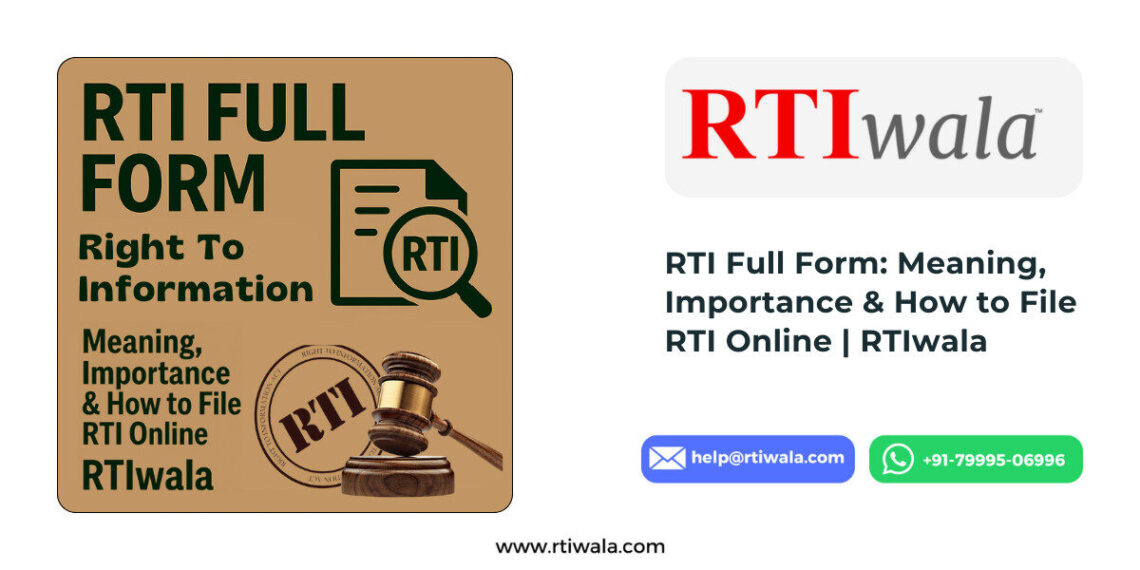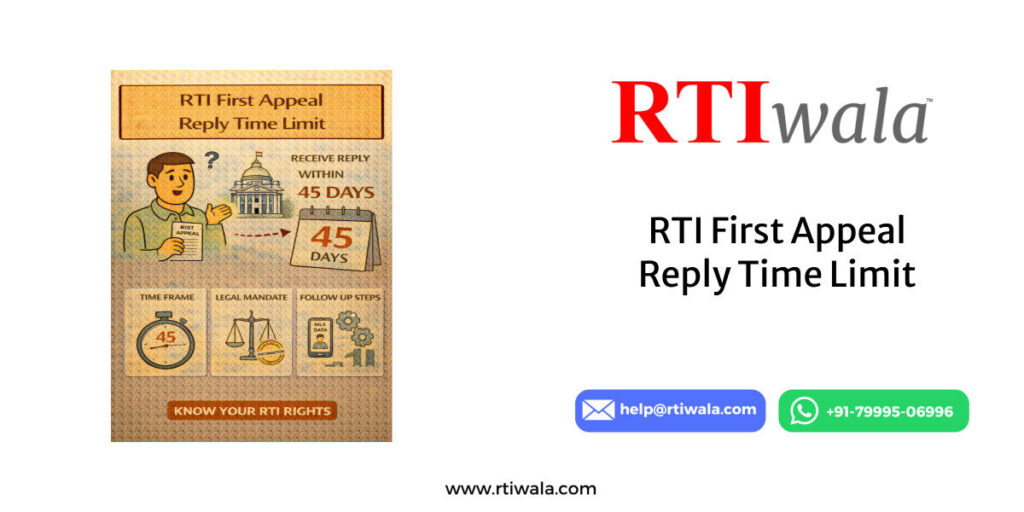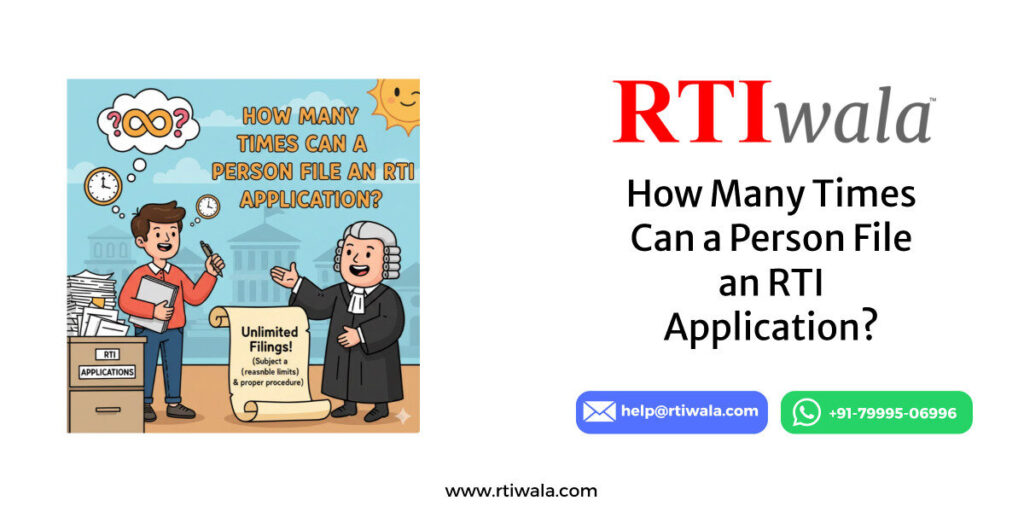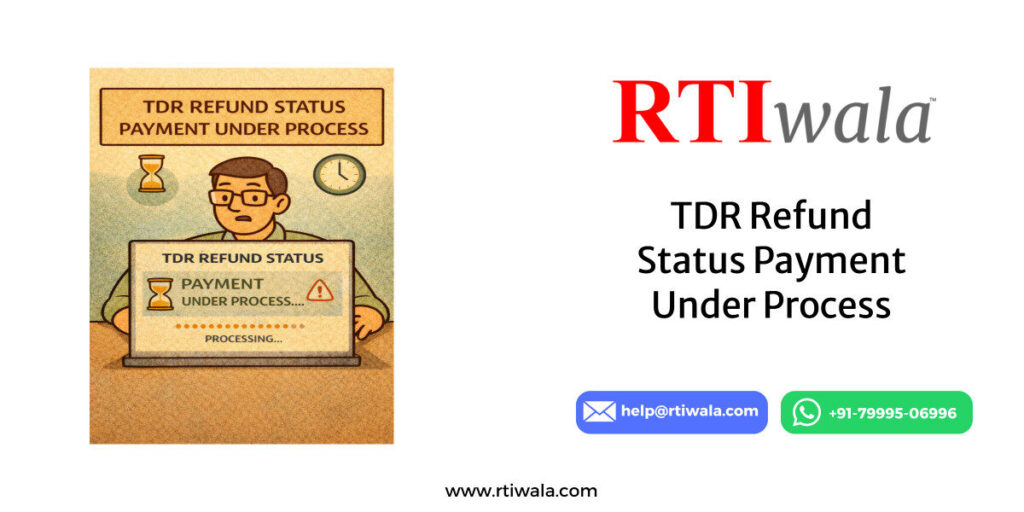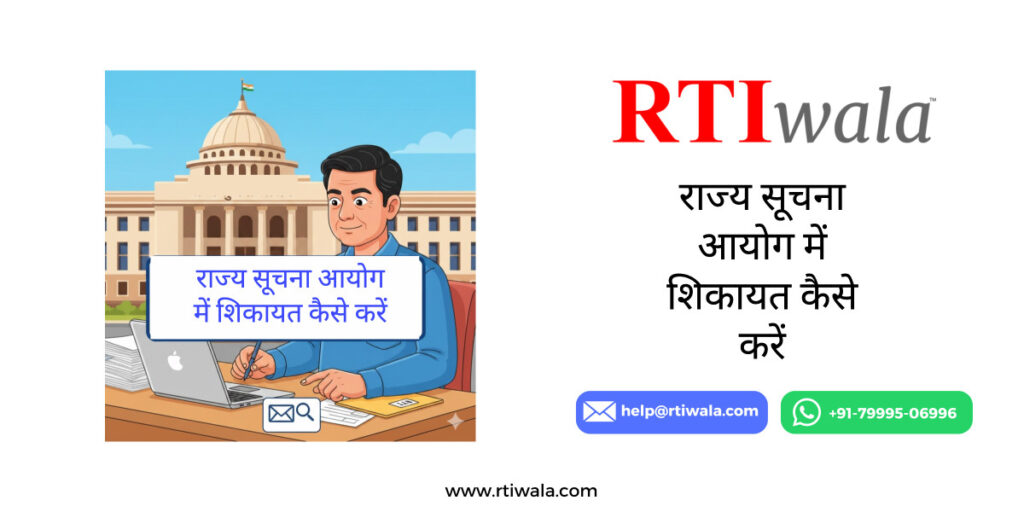Table of Contents
- RTI Full Form: What Does RTI Mean?
- Importance of RTI Act in India
- Who Can File an RTI Application?
- RTI Timelines: How Long Does It Take?
- Fear Factor: What Happens If You Don’t File RTI?
- How to File Right to Information (Step-by-Step)
- Why Choose RTIwala for Filing RTI Online?
- Real-Life Examples of RTI in Action
- FAQs on RTI Full Form and Filing
- Conclusion: File Online RTI with RTIwala
1. RTI Full Form: What Does RTI Mean?
The RTI full form is Right to Information. It is a law enacted in 2005 by the Government of India, giving citizens the legal right to seek information from public authorities.
Every citizen can file an RTI application and demand answers about government decisions, fund allocation, recruitment, police cases, or public projects.
But knowing the RTI full form is only the beginning. The real challenge is filing it correctly.
That’s where RTIwala helps citizens with online RTI India filing services, ensuring accuracy and timely responses.
2. Importance of RTI Act in India
The Right to Information Act, 2005, is considered a cornerstone of Indian democracy. It:
- Promotes transparency and accountability.
- Empowers citizens to question government actions.
- Helps expose corruption, fund misuse, and irregularities.
- Protects public interest by ensuring timely delivery of services.
Example: Applying RTI, a villager discovered that funds for road construction in his district were siphoned off, as the project existed only on paper.
3. Who Can File an RTI Application?
- Any citizen of India can become an RTI applicant.
- There is no age or educational qualification limit.
- NRIs can also file RTIs in certain cases.
However, an RTI must be filed in the correct format, addressed to the correct Public Information Officer (PIO), and with a clear question. A wrongly filed RTI gets rejected—something that happens often without professional help.
That’s why thousands of people now prefer RTIwala to file RTIs online safely.
4. RTI Timelines: How Long Does It Take?
According to the Act:
- Public authorities must reply within 30 days of receiving an application.
- For urgent matters (life and liberty), a reply must be given within 48 hours.
- If no reply is received, the applicant can file a First Appeal and later a Second Appeal.
But many applicants face delays because their applications are vague or improperly drafted. Filing with RTIwala ensures your queries are legally strong and not ignored.
5. Fear Factor: What Happens If You Don’t File RTI?
- Your land records could be altered without your knowledge.
- Exam results and recruitment cut-offs may never be disclosed.
- Police FIRs or investigation status may remain hidden.
- Pension, PF, or welfare benefits may be delayed indefinitely.
Without RTI, corruption and negligence thrive. By not using your right, you risk losing your money, justice, or even your future opportunities.
Example: Many students lost their chance to challenge exam irregularities because they never filed RTIs for their answer sheets.
6. How to File Right to Information (Step-by-Step)
Step 1: Identify the Authority
Choose the correct department (Police, Education, Revenue, etc.).
Step 2: Draft the RTI Application
Write clear, specific questions. Example:
- “Please provide certified copy of FIR No. 123 registered at XYZ Police Station.”
- “Please share cut-off marks of SSC Exam 2024.”
Step 3: Pay the RTI Fee
₹10 is the standard fee.
Step 4: Submit the Application
- Offline: By post to the concerned PIO.
- Online: Leverage RTIwala for hassle-free filing of RTIs online in India.
Step 5: Track & Receive Reply
Receive your response within 30 days.
With RTIwala, you don’t just file online RTI but also get appeal support in case of delays.
7. Why Choose RTIwala for Filing RTI Online?
Filing RTI on your own may sound simple but is full of risks. RTIwala eliminates them:
- Expert Drafting – Strong and legally valid applications.
- Correct Authority Selection – Saves time and avoids rejections.
- Appeal Support – First and Second Appeals filed when replies are incomplete.
- Confidential Filing – Protects identity in sensitive cases.
- Nationwide Service – From Delhi to remote villages, you can apply for RTI online anywhere.
8. Real-Life Examples of RTI in Action
- Recruitment Transparency: RTI revealed cut-off marks and exposed irregularities in exams.
- Land Record Case: Farmers secured land rights after filing an RTI for revenue records.
- Police FIRs: RTI forced police to release case updates that were being suppressed.
- Welfare Funds: RTI exposed misused village development funds.
These real cases show how filing an RTI online with expert help ensures truth and justice.
9. FAQs on RTI Full Form and Filing
Q1. What is the full form of RTI?
RTI stands for Right to Information.
Q2. Who can file an RTI application?
Any Indian citizen can file an RTI.
Q3. How many days does it take to get an RTI reply?
30 days normally, 48 hours in urgent cases.
Q4. Can I file RTI online in India?
Yes, you can file an RTI online easily with RTIwala.
Q5. What if my RTI is rejected or ignored?
You can file an appeal, and RTIwala helps with strong drafting and appeals.
10. Conclusion: File Online RTI with RTIwala
The RTI full form may be simple, but its power is immense. It is your constitutional right to demand information and hold authorities accountable.
Don’t let poor drafting or wrong filing deny you justice.
With RTIwala, you can confidently file online RTI in India and get timely replies.
Call: +91-7999-506-996 now!
RTI stands for the Right to Information. It is a fundamental right of Indian citizens to seek information from public authorities and government departments, promoting transparency and accountability in governance under the Right to Information Act, 2005.












































